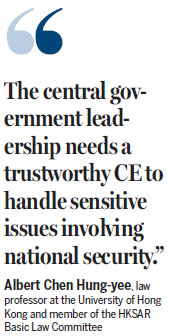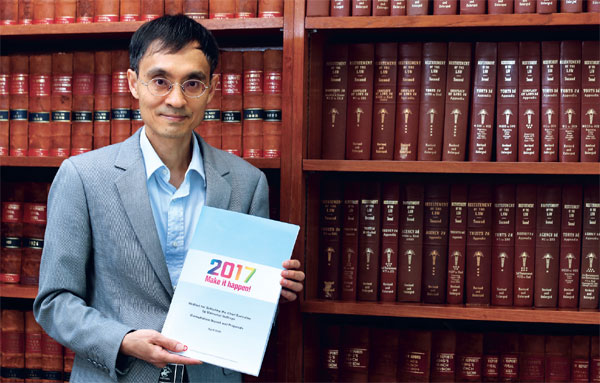Checks on CE candidates needed, says Albert Chen
Updated: 2015-05-19 07:24
By Kahon Chan in Hong Kong(HK Edition)
|
|||||||||
|
Albert Chen Hung-yee, law professor at the University of Hong Kong and member of the HKSAR Basic Law Committee, highlights the importance of national security in the design of the electoral reform package in an exclusive interview for China Daily on Monday. Parker Zheng / China Daily |
A vetting process for Chief Executive candidates prior to an election by universal suffrage was essential because the post is vested with key powers which concern the country's security and sovereignty, Basic Law adviser Albert Chen Hung-yee said.
Since 1997 the former dean of the University of Hong Kong's faculty of law has served on the HKSAR Basic Law Committee, a statutory working group that advises the Standing Committee of the National People's Congress (NPCSC). He is one of the two longest-serving committee members.
The Basic Law provides that the Nominating Committee (NC) is an integral part of the proposed election by universal suffrage. After the election victory, the CE-elect must first secure appointment by the central government before taking office.
In an exclusive interview Chen told China Daily that while the central government has the power to appoint the local CE, any veto of an appointment - rejecting the choice of the full electorate -could trigger political turmoil in Hong Kong.
He said there are obvious reasons for the central government to exercise caution: The executive branch dominates the political structure formulated in the Basic Law and the head of the administration is vested with great powers, explained Chen.
"The central government leadership needs a trustworthy CE to handle sensitive issues involving national security," Chen said.
"They also have to ensure this CE will uphold allegiance to the People Republic of China, and not collude with foreign regimes on acts that would jeopardize Chinese interests," he added.

Instead of bearing the risk of political crises, Chen noted the transparent selection process by the 1,200-strong NC could act as a test of the integrity for the city's future leader - the political orientation of contenders would be part of that test.
It's not that no opposition contenders would qualify - but Chen observed that since over the past two decades the opposition camp has often chosen an agenda that went contrary to the stance of the central government, talks before the vote on reform would be unlikely to close the gap in mutual trust between the two sides.
The opposition is seeking concessions through dialogue with the country's senior officials. But Chen affirmed that Beijing would not compromise on the principles outlined in the resolution adopted by the NPCSC on Aug 31, 2014.
Chen has actively suggested ideas in an attempt to bring the two sides closer to an agreement. In January, he suggested a proposal that would see blank ballots play greater roles in election results. But this was dropped due to the inconsistency of current practice.
Though some opposition moderates have recently revisited his proposal, Chen himself said his belief was that the government's April 22 proposals were the only choice left for lawmakers, who will vote on the reform package in six weeks.
Polls showed the current reform blueprint is opposed by no more than 40 percent of residents - most of whom are opposition followers. By contrast, in past elections opposition lawmakers have been known to draw in about 55 percent of all ballots.
He noted that the difference could translate into a slip in support in the next LegCo election - the opposition lawmakers could lose their critical minority in the chamber if they insisted on voting down a popular reform package.
Chen also believes the election arrangements could see further improvements in 2022 and 2027, respectively. He anticipated the elector base of the NC to expand in 2022. The committee's size and number of candidates could be further expanded in 2027.
He said the popular election of the CE was vital for Hong Kong as the CE had a direct and crucial influence on policymaking and public finance. "This would be a significant advance for Hong Kong's political system," said Chen.
kahon@chinadailyhk.com
(HK Edition 05/19/2015 page4)
